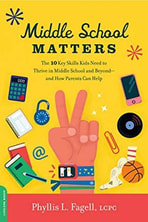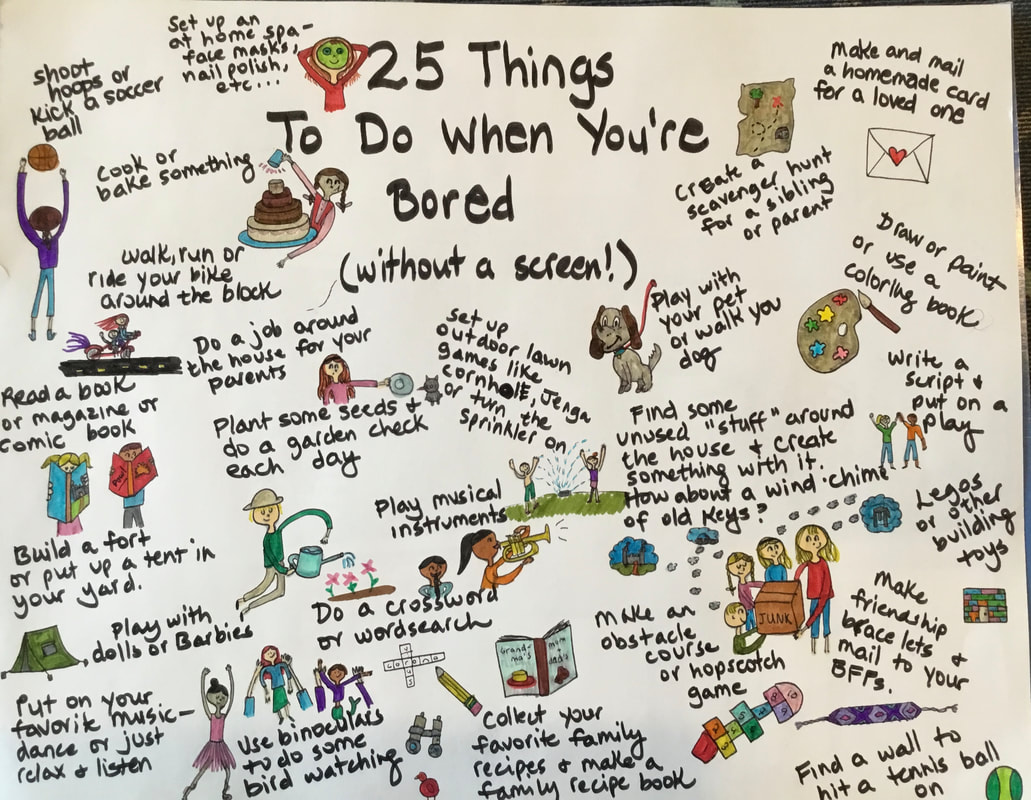 Back in March, when we came home from school and work for two weeks, who could have imagined that we would now be into our seventh month of living our lives on screens?? As we gear up for a Fall of telehealth sessions, I would like to share some tips to make our sessions run as smoothly as possible!
0 Comments
Outside/Active
Creative Activities
Do a Good Deed
Reading and Writing
Lunch and Learn!
In the evenings…
Online Camps and Classes
I would love to hear about what you are doing to keep busy this summer. Drop me a line at drledley@me.com with your ideas and I will update this list!  I am a silver lining sort of person. There is no doubt that a global pandemic is really, really awful. We have now been home for ten weeks. We have missed celebrating meaningful events and holidays with family and friends; we've worried about our front-line workers and elderly relatives; we've mourned the loss of teams and music groups and volunteer groups; and of course, we've endured the challenges of working and learning from home. But, what about all that kids are learning during this time? Without the sun-up to sun-down rushing that typically guides our lives, how have our kids filled this time? To me, the silver lining is that many kids are filling their time with acquiring and building life skills! This is so great! -A few of my patients have learned to ride two-wheelers, probably a few years after they should have! And, older patients who had felt very anxious about learning to drive have embraced this life skill on our quieter streets. -So many kids are cooking, baking, and gardening. These are skills they will use forever. -One friend posted on Facebook that her kids built a bike course, a tree swing, and the frame to a car (like one you can drive!). How cool is that? -There is no doubt that the current generation of parents is more overprotective than our parents were of us (check out http://www.freerangekids.com). This unique time is allowing kids to set off on their own for adventures in their neighborhoods. Yesterday, my kids biked into our little town on their own and navigated buying an ice cream while following all the new COVID rules to keep them and people around them safe. They were so proud of themselves when they got home! -How about CLEANING? Without a regular cleaning person, many families are scrubbing toilets and changing beds and doing lots of laundry and dishes! Okay, full disclosure - getting the kids involved in this one hasn't been easy in my house (the groaning tends to take longer than the doing). However, the pay-off is huge. Between ages 17 and 30, I did all of my own cleaning. How great that our kids are building the confidence now so that when they head out into the world, they will know how to keep their environments clean and pleasant. -A major life skill is learning how to BE comfortable with oneself. It is so important to discover how to structure an empty day so that at the end of it, you feel like it was a day worth living. Without their over-structured days, kids are really having the opportunity to learn this skill. Kids are waking up each morning and depending on their age, they need to set their schedule for the day. By this point in quarantine, many kids have realized that endless video games does not feel good at the end of the day. So what does? Kids are learning what gives them a sense of accomplishment, what makes them feel happy, what makes them feel calm and relaxed. To me, this might be the most important life skill of all. What life skills have your kids learned during quarantine? I'd love to hear! Have you been battling getting your kids (or yourself?!) off screens since the COVID quarantine began? Take a look at these 25 Things to Do When You Are Bored (without a screen). Thanks so much to my amazing 14-year old daughter for her charming illustrations :) Do you have ideas for 25 MORE Things To Do When You Are Bored? Let us know!
1. Maintain regular sleeping and eating routines.
-even though baking is a fun quarantine activity, overeating will lead you to feel sluggish and unhappy. All food is good food – but everything in moderation! 2. Keep up social connections. -schedule some Zoom or Facetime chats with friends each week. If you find it difficult to make casual conversation, plan to play a game or discuss a book or movie with your friend(s). -take advantage of “social events” offered by groups you feel connected to – like your church/synagogue, volunteer organizations, schools, etc. -Have the patience to help older relatives and friends get up to speed with new technologies so that they can feel connected too. 3. Get exercise every day, preferably outdoors. -Be mindful of keeping a safe distance. -Be creative – find a wall on which to play solo tennis, make a hopscotch course on the driveway, do yoga on your porch, explore new streets in your neighborhood. 4. Make sure that each day includes activities that give you a sense of MASTERY. -mastery activities are those that give you a sense of accomplishment. These are the activities that might not necessarily be fun, but feel good to check off the “to do” list. -make sure you set reasonable goals each day for mastery activities. Rather than setting the goal of cleaning your whole house for example, plan to clean the bathrooms one day and vacuum another day. -examples of mastery activities are school work, work, household chores, etc. 5. Make sure that each day includes activities that give you a sense of PLEASURE/FUN. -pleasure activities are activities that give you little lift because they are fun! -make sure that screen time is not your only source of fun. While some time on Netflix is indeed fun, sitting for hours watching TV tends to not be good for our moods. -examples of fun activities include listening to or playing music, doing a craft, doing something physical or athletic, playing with a pet, gardening, reading, etc. If you are finding the days under quarantine very aimless, try making yourself a daily hour-by-hour schedule. Make sure that you include all of these items in your daily schedule – healthy meals, a good night’s sleep, exercise, social time, mastery activities and pleasure activities. I've created a new In the News page for articles about COVID-19 . My goal is to keep adding to my blog with helpful resources by colleagues and friends - there is an overwhelming amount of good information out there for kids and families. I'm trying to get this done between online therapy sessions; helping with homeschool; getting some exercise each day; doing endless cooking, cleaning, and laundry; and (ironically) reviewing an upcoming book about repetitive negative thoughts. More to come....I promise!
On April 9, 2020, Governor Wolf announced that PA schools will not re-open until the Fall. With this in mind, I will continue sessions by tele-therapy until further notice. I have adjusted my schedule to accommodate the competing demands of my practice and my family. You may receive an email with a rescheduled appointment time in the next few weeks. I am trying to spread appointments evenly throughout the week. If you receive a new time that does not work for you, please write me back and we will work it out!
When we first began to shelter at home, I was not taking new patients, thinking that I would rather meet new families in person. Seeing that this might be quite a while off, I will be taking a limited number of new patients "remotely." Please fill in the new patient information form and we can discuss further whether tele-therapy is appropriate for your family. Please let me know if there is any desire for some zoom therapy groups. I was thinking about parent support groups; groups for kids whose parents work in the healthcare field; and groups for kids whose senior year of high school or college has abruptly ended. Sharing these experiences with others in the same boat can be very comforting. Drop me a note to let me know if these groups interest you: drledley@me.com. Please stay well, and let me know how I can best support you! Deborah Ledley Dear Patients and Families:
Due to the COVID-19 pandemic, I will be seeing all of my patients remotely until further notice. You can make and change appointments using my online system as usual. I might be in touch to change appointment times in order to best balance work and family commitments. I have added a consent form for telepsychological services to required patient forms. Please complete and email back to me - or alternatively, snap a picture of the completed form and email back to me. This is an anxiety provoking time for everyone. If you already suffer from an anxiety disorder, this time of uncertainty might be heightening your symptoms. There are many available resources that you might find useful: https://adaa.org/finding-help/coronavirus-anxiety-helpful-resources https://myocdcare.com/coping/ https://www.washingtonpost.com/lifestyle/wellness/anxiety-coronavirus-mental-wellness-tips/2020/03/16/f187faf2-67b8-11ea-9923-57073adce27c_story.html More to come! Send me your questions or requests for online support/psychoeducation groups and I will try to make them happen :) Deb Ledley Originally published at adaa.org.
When a baby arrives, gifts are most often given to the new little bundle of joy rather than to the new parents. Parents might find their homes heaped with adorable onesies, brightly colored chew toys, and board book editions of childhood favorites. What do new parents need? I suggest some wisdom of cognitive-behavioral therapy (CBT) from a book, a supportive friend, a group for new parents, or maybe even some sessions with a skilled therapist. Why is CBT such a natural intervention for new moms? The Mismatch Between Expectations and Reality From the day of birth, many moms experience a stark discrepancy between what they expect from birth and new motherhood and what actually happens. Many moms create a formal birth plan, or at the very least, spend nine months imagining what their baby’s birth will be like. As they say, “best laid plans!” Events outside of one’s control might change many facets of this carefully thought out event, including of course how the baby is delivered (e.g., cesarean section instead of a natural birth). Another mismatch can be how woman imagine that they will feel the moment they meet their baby and how they actually feel. We all hear about immediate love and bonding. But, what if it doesn’t happen? Many women first hold their newborn after hours of painful labor; no food, drink, or rest; and stressful moments pertaining to both mom’s and baby’s health. It is no wonder that when moms finally meet their babies, we are often totally exhausted and frankly, pretty out of it! And before we can even say hello, or examine all of the baby’s precious little fingers and toes, there is pressure to learn to nurse (which does not come as naturally as one might expect) and an influx of visitors (some wanted, and some not so wanted). Is it any wonder that many women do not feel an immediate bond, but rather feel a flood of all sorts of emotions – some on the more negative end of the spectrum? A helpful strategy to embrace is acceptance. We cannot change how our birth experience goes. We cannot change how we feel in those first few hours or days of motherhood. Rather, we can look at this personal narrative without judgment. “This is different from what I expected and that’s okay,” “I feel different than I thought I would and that’s okay.” New moms should also recognize the impermanence of their feelings. In any given hour, let alone in those first days and weeks, new moms will experience a whole range of feelings, from positive to negative. We can recognize these feelings with interest, rather than with judgment. Research into unwanted thoughts has also taught us that the more we try to suppress thoughts, the more we have them. Therefore, new moms should be encouraged to let in all thoughts and to share their thoughts and experiences with others. The more we do this, the less scary our thoughts become. And by sharing experiences with others, we often find that other are feeling the exact same way. Negative Self-Talk As the weeks of new motherhood progress, negative self-talk can go along with it. This is especially true when people are sleep deprived and when hormones are raging. There is a lot of time to think when you have a new baby, especially because new babies are not great conversationalists! Here are some examples of negative self-talk: • If the baby is crying endlessly and can’t be soothed --“The baby doesn’t like me.” “I don’t know how to help him.” • If breast-feeding isn’t going well, --“I am a failure at this.” “This is supposed to be natural. Maybe I shouldn’t have even had a baby.” • If there are moments of negative thoughts or emotions like boredom or loneliness or anger, -- “I shouldn’t be feeling this way.” “I should be grateful to even have a baby” Cognitive therapy teaches us to ask, “Is there another way to look at this situation?” Another great way to approach negative thoughts is to ask, “What would I say to my sister or best friend if she believed this?” This might lead us to the following calming thoughts: • “Babies cry. Sometimes for no reason. And that is okay.” • “My job is to feed my baby. There are lots of ways to accomplish that task” or “The baby and I are learning a new skill. Any new skill takes time and practice.” • “All feelings are valid. Some moments will be happy or funny and some will be frustrating or boring. I can notice these feelings, but I don’t need to judge myself for them.” • “I have no idea how other moms are feeling. Chances are many other moms are feeling the same way as I am.” Falling into the Baby Blues or Post-Partum Depression Being home with a new baby can take on an aimless quality. Babies do not adhere to a schedule and planning things around them can be awfully hard. While a lot of women are used to holding down challenging jobs, they might have a hard time adjusting to days where it is difficult to even find time to shower or do laundry. Women who have a perfectionistic streak might fall into the trap of avoidance rather than doing things less than perfectly. For example, a new mom might choose to miss lunch with a friend if she doesn’t have time to shower first or might stop cleaning the house because she can’t do it as perfectly and completely as she did before baby. Days at home with a new baby can lead to feelings of loneliness, sadness, anger, and anxiety. Many new moms will find it helpful to draw on the lessons of behavioral activation, making a schedule to bring some structure to each day. These daily schedules should include some very manageable items that bring them a sense of mastery (e.g., clean one room in the house, rather than the whole house; write two thank you notes) and a sense of pleasure or fun (e.g., get together with a fellow new mom; watch a fun TV show while baby naps). Each week should include some social activities (I’m a big fan of having new mom friends) and, after the first 6 weeks or so, some activities that a woman used to enjoy before becoming a mom (e.g., resuming an exercise class; meeting a friend for a coffee). While the schedule will need to be somewhat flexible due to the needs of a new baby, moms should also be mindful that they might need to change their own expectations of what they should accomplish in a day or how they should look or feel before going out. Suggested resources for new moms: • This Isn’t What I Expected, by Karen Kleinman & Valerie Raskin • Becoming a Calm Mom: How to Manage Stress and Enjoy the First Year of Motherhood, by Deborah Ledley • Motherhood Sessions podcast, Alexandra Sacks (and also her book with Catherine Birndorf What No One Tells You: A Guide to Your Emotions from Pregnancy to Motherhood) *Although I have referred mostly to new moms in this post, the lessons of CBT are relevant to all new parents.  Looking for some excellent back to school reading? Pick up a copy of Middle School Matters by Phyllis Fagell. I follow Phyllis on Twitter and had pre-ordered this book as soon as she began tweeting about it. It arrived last week and I have been eagerly reading every word between doing camp laundry, buying school supplies, and driving my daughter to pre-season sports. Despite this book being about Middle Schoolers, I am finding so many gems for a much wider range of kids, from the upper elementary ages to new high schoolers. As a mom of an incoming Middle Schooler and High Schooler this year, and a psychologist who works with kids, I am highlighting like mad! Here are some gems so far - -"on different days, the same kid may present as thirteen going on thirty or thirteen going on three." -because of the underdeveloped prefrontal and frontal cortices of teens, smart kids can do stupid things. We should expect mistakes - some pretty frightful! Turn these into teachable moments rather than "life sentences". -Friendships change immensely over the course of middle school. One study actually showed that only 1% of friendships formed in 7th grade were still intact by 12th grade! As parents, we need to expect this, understand that it is part of growing, and not catastrophize these changes (e.g., assuming a tough social period in 7th grade will mean lifelong social disaster). -Help kids find activities that interest them, that introduce them to kids with shared interests, and that play to their strengths. I.M.O., this is a very different approach from picking activities that will help kids get into an Ivy League school! Fagell writes, "When children are young, they find friends based on proximity. As they get older, they find friends based on similarity. This transition is one of the fundamental challenges of middle school..." So much more to share! But really, buy this book and read it for yourself. It's super! |
Dr. LedleyI am a licensed psychologist working with kids, teens, and adults with anxiety disorders. Categories |

 RSS Feed
RSS Feed